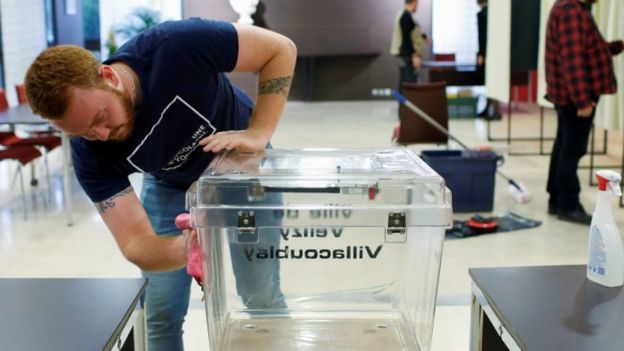 |
|
There has been criticism of the decision to allow elections in France |
Austria is to ban gatherings of more than five people from Monday, as efforts to combat the spread of the coronavirus in Europe step up.
Romania is set to declare a state of emergency, and the Czech PM said he was likely to declare a quarantine for the whole country.
The moves follow draconian measures taken by France and Spain on Saturday.
But France is holding local elections, despite the shutting of cafes, restaurants and most shops.
Italy, which has recorded more than 1,440 deaths, began a nationwide lockdown on Monday.
The Czech Republic and Slovakia have already closed their borders.
The World Health Organization (WHO) said on Friday that Europe was now the "epicentre" of the pandemic.
WHO head Dr Tedros Adhanom Ghebreyesus has urged countries to use aggressive measures, community mobilisation and social distancing to save lives.
France veers towards the Chinese model
Debate is raging in France about what is the better model for tackling Covid-19 - the Chinese or the British. The Chinese have taken a radical system of confinement for limiting the spread - the UK is adopting a "herd immunity" approach, according to which infection of a majority is inevitable and even, if properly handled, to be welcomed.
Up until a couple of days ago, it seemed France leaned more to the "herd" philosophy. As in Britain, the official view favoured a controlled propagation - buying time so that the wave of infections is drawn out over a long period, and hospitals are not overwhelmed.
But now, suddenly, there is a shift in the other direction. First schools, then cafes, restaurants and all non-essential shops are to be closed. It seems the government now thinks Chinese- and Italian-style - draconianism is more appropriate. Except when to comes to the municipal elections, which are going ahead as planned.
If it all feels not a little improvised, that is perhaps excusable. We have, after all, never seen anything like this before.
What are the latest measures?
Austrian Chancellor Sebastian Kurz urged people to self-isolate and banned gatherings of more than five people as of Monday.
He added the UK, the Netherlands, Russia and Ukraine to a list of countries, entry to whose citizens is restricted.
Schools and most shops will be closed from Monday, following an earlier announcement.
Meanwhile, the prime minister of the neighbouring Czech Republic, Andrej Babis, said in a TV interview he would propose to government that the entire country should be put under quarantine.
He said the number of cases in the country had risen from 214 to 231, with no fatalities.
Romania, which has 123 cases, is set to declare a state of emergency on Monday.
On Saturday Spanish Prime Minister Pedro Sánchez said citizens should not leave home, except for buying essential supplies and medicines, or for work.
The state of emergency there will last for two weeks - more if deemed necessary and parliament approves.
With 191 deaths, Spain is Europe's worst-hit country after Italy.
In France the closure - which went into force at 23:00 GMT on Saturday - applies to restaurants, cafes, cinemas and nightclubs as well as non-essential businesses.
Prime Minister Édouard Philippe also asked people to reduce their travel, especially between towns.
France, with a population of 63.5 million people, has reported more than 4,400 confirmed cases after a sharp rise on Saturday. It recorded 12 more deaths, bringing the toll to 79. BBC